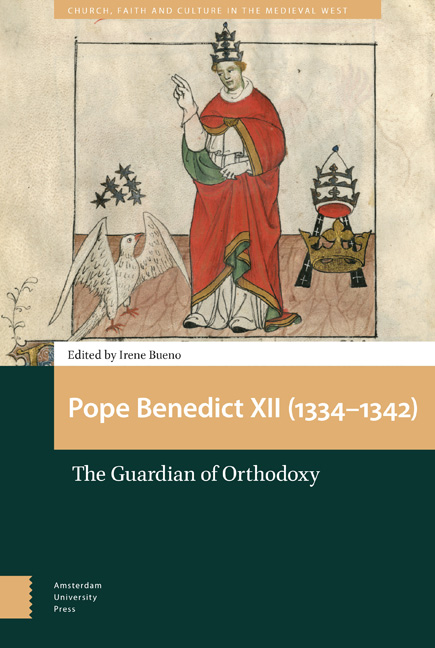Book contents
- Frontmatter
- Contents
- Abbreviations
- List of Illustrations
- Introduction: Benedict XII, the Guardian of Orthodoxy
- 1 Jacques Fournier and Thirteenth-Century Inquisitorial Methods
- 2 Recovering a Theological Advice by Jacques Fournier
- 3 Benedict XII and the Beatific Vision
- 4 A New Seat for the Papacy: Benedict XII, Avignon, and the Comtat Venaissin
- 5 In the Footsteps of St Peter: New Light on the Half-Length Images of Benedict XII by Paolo da Siena and Boniface VIII by Arnolfo di Cambio in Old St Peter’s
- 6 Benedict XII and Italy: Restoring Orthodoxy and Consolidating Papal Sovereignty after John XXII
- 7 Benedict XII and the Outbreak of the Hundred Years’ War
- 8 Benedict XII and the Crusades
- 9 Benedict XII and the Partes Orientis
- Index of Names
- Index of Subjects
6 - Benedict XII and Italy: Restoring Orthodoxy and Consolidating Papal Sovereignty after John XXII
Published online by Cambridge University Press: 11 December 2020
- Frontmatter
- Contents
- Abbreviations
- List of Illustrations
- Introduction: Benedict XII, the Guardian of Orthodoxy
- 1 Jacques Fournier and Thirteenth-Century Inquisitorial Methods
- 2 Recovering a Theological Advice by Jacques Fournier
- 3 Benedict XII and the Beatific Vision
- 4 A New Seat for the Papacy: Benedict XII, Avignon, and the Comtat Venaissin
- 5 In the Footsteps of St Peter: New Light on the Half-Length Images of Benedict XII by Paolo da Siena and Boniface VIII by Arnolfo di Cambio in Old St Peter’s
- 6 Benedict XII and Italy: Restoring Orthodoxy and Consolidating Papal Sovereignty after John XXII
- 7 Benedict XII and the Outbreak of the Hundred Years’ War
- 8 Benedict XII and the Crusades
- 9 Benedict XII and the Partes Orientis
- Index of Names
- Index of Subjects
Summary
Abstract
In the early fourteenth century, the first Avignon popes were confronted with a large movement of protest against their authority in northern Italy and the States of the Church at a time when the power of local lords was increasing. The unrest reached its climax during the pontificate of John XXII (1316–1334). To face those numerous oppositions, legal proceedings were widely used within the usual framework of temporal jurisdiction or following the more spectacular rules of the officium Inquisitionis. At his election in 1334, Benedict XII inherited this situation, and during the whole of his pontificate these questions of rebellion and tyranny were to remain in the foreground. Thus this chapter aims to shed light on the various facets of Benedict's politics towards Italy, between conciliation and intransigence.
Keywords: Benedict XII, John XXII, Italy, tyranny, Papal States
Benedict XII, as is well known, made a far greater contribution than did John XXII to establishing the papacy on the banks of the Rhône. A few months after acceding to the papal throne, he started the construction of a new pontifical palace, larger than the previous one and more appropriate for developments within the Curia. He then ordered that the Church archives, which at that time were still kept in Assisi, be transferred to Avignon. Finally, in 1337, he abandoned the effort to return to Rome, gradually yielding to the arguments of those in the Curia who claimed that the situation in Italy and Rome was too serious and too dangerous. Throughout his pontificate Italy was, therefore, a field of intervention rather than familiar ground, given that the pope never had the opportunity to go there.
Since the late nineteenth and early twentieth century, with the opening of the Vatican Archives to researchers, Benedict XII's relations with the peninsula have attracted the interest of historians such as Heinrich Otto, Guillaume Mollat, Gerolamo Biscaro, Giovanni Tabacco, and Eugenio Duprè Theseider. This is not surprising, since Italian matters were among the major items of expenditure for the popes of the fourteenth century.
Benedict XII inherited a particularly explosive situation in Italy, rent by factional struggles and where political regimes were being transformed and maturing.
- Type
- Chapter
- Information
- Pope Benedict XII (1334–1342)The Guardian of Orthodoxy, pp. 167 - 190Publisher: Amsterdam University PressPrint publication year: 2018

